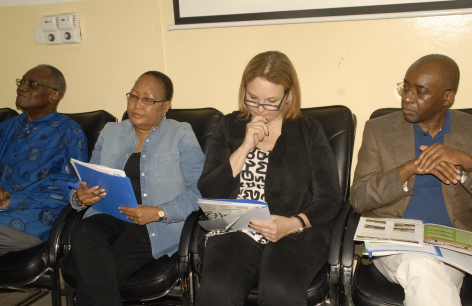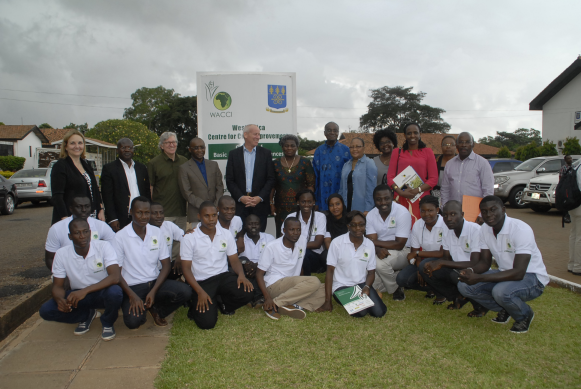Mr. Strive Masiyiwa, Board Chair of the Alliance for a Green Revolution in Africa (AGRA) and Chief Executive Officer of Econet Wireless International together with some members of the AGRA Board including the President of AGRA, Dr. Agnes Kilabata have visited the West Africa Centre for Crop Improvement (WACCI) to acquaint themselves with developments at the Centre.
The Dean of International Programmes at the University of Ghana, Prof. Naa Ayikailey Adamafio, who represented the Vice-Chancellor welcomed the delegation to the University and to the Centre. In her opening remarks, she commended the Director of WACCI, Professor Eric Yirenkyi Danquah and his team for such a meritorious feat. She said that the University of Ghana was proud of what WACCI has been able to achieve since inception and the important role AGRA is playing in the area of support. She mentioned that WACCI’s PhD Programme attracts the largest number of international graduate students to the University of Ghana, which is in line with the University’s internationalisation plan.

From the left, Moise C. Mensah, Mohohlo L. K. , Josette Sheeran, Strive Masiyiwa
Dr. Rufaro Madakadze, Program Officer in charge of Education and Training in the Seed Programme at AGRA, reported that there has been great improvements in plant breeding techniques resulting in tremendous impacts in the respective African countries that have benefited from the WACCI PhD programme. She added that several PhD students in a number of African countries have been trained so far under the AGRA Program for Africa's Seed Systems (PASS).
The Director of WACCI, Prof. Eric Yirenkyi Danquah, gave a brief presentation on the topic, “WACCI: An emerging Centre of Excellence for training plant breeders in Africa”. He mentioned some current major challenges facing the Agricultural sector in Africa such as insufficient funds for the training of breeders and lack of proper education for farmers, and emphasized the need for collaboration between government and scientists in Africa in order to transform the Agricultural sector and enhance agricultural productivity through genetic improvements of crops.
Prof. Danquah walked the Board of Directors through developments since inception of the WACCI project in 2007 showing how the initial investments by AGRA had attracted several donors including the DAAD-Germany, the Syngenta Foundation for Sustainable Agriculture-Switzerland, the USAID Ghana Programme and the World Bank to invest in WACCI. He said that current enrollment stood at 81 students out of which 28 had completed their studies and returned to their home institutions. He added that this year, WACCI enrolled its largest cohort of 15 students with majority of them having their own funding from their home institutions. He argued that this was an indication that the WACCI project could be sustainable if donors continued to invest in it beyond the AGRA funded phase which ends in 2017. Prof Danquah highlighted some impact stories of the first WACCI graduates which included the near release of a number of varieties of sweet potato, rice, maize, sorghum and pear millet in Burkina Faso, Ghana, Mali and Niger. He also submitted that these results could not have been achieved if the students had trained outside Africa. He said that about 30 publications had come out of students’ theses research projects to date. Prof. Danquah outlined WACCI’s strategy for sustainability ending that a Centre Commissioned Panel was expected to submit its report by the end of March 2015. He hoped the report would be the blueprint for developing a strategic plan to transform WACCI into a World Class Centre for training Plant Breeders for Africa. He commended AGRA for the audacity to launch the PhD programme and thanked the Board of Directors for visiting the Centre to learn about developments.
Some graduates and final year students of WACCI gave accounts of how the programme had been beneficial to them. Dr. Maxwell Asante Darko, a graduate from the first cohort testified of how WACCI had been a game changer in his career. He stated the numerous rice lines he had developed, after his graduation from WACCI, that are presently being tested in the field which he believes will change the phase of rice production in Ghana due to their high yielding traits and tolerance to major rice threatening diseases.
Dr. Agnes Kalibata, President of AGRA, in her remarks thanked the University for supporting the WACCI programme. She also commended the Director of WACCI and the AGRA PASS team for doing an amazing job with the programme.
Mr. Strive Masiyiwa spoke on behalf of the Board of Directors of AGRA. He said the students were at ‘Ground Zero’ for ending hunger and food insecurity in the West and Central African sub-region. He went on to advise the students to take on their work at WACCI as a mission and charged them to solve the problem of food insecurity in the next 15 years. He also emphasised that their success will not be based on the PhD they have earned but on the fact that there is no more hunger on the African continent. He said the challenges of WACCI were well noted and promised the continued support of AGRA to the programme.
Other Board Members at the meeting were Jeff Raikes, Co-Chair, Programs and Policy Committee and immediate past CEO of the Bill and Melinda Gates Foundation, Moise C. Mensah, Chair, Nominations and Governance Committee, Josette Sheeran, Chair, Finance, Budget and Compensation Committee, Mohohlo L. K., Governor of the Bank of Botswana. Other participants at the meeting included Dr. Joe DeVries, Director of PASS, AGRA, Dr. Kwasi Ampofo, Country Manager of AGRA Ghana, Mrs. Stella A. Amoah, Director of Public Affairs of the University of Ghana as well as staff and students of WACCI.
Members of the AGRA Board of Directors together with all participants of the event also visited the WACCI Experimental farm to inspect the WACCI Maize Breeding Programme. The model maize breeding programme with farm houses and irrigations facilities allow students to engage in practical maize breeding activities prior to their theses research.
The West Africa Centre for Crop Improvement (WACCI) was established in 2007 as a partnership between the University of Ghana and Cornell University with initial funding from the Alliance for a Green Revolution in Africa (AGRA) to train plant breeders, at the PhD level, with expertise to improve the indigenous crops that feed the people of the sub-region. Since inception, the Centre has enrolled 82 PhD students from 12 African countries and graduated 18 students from two cohorts. The Centre has attracted over 4 million US dollars from multiple donors in addition to the initial grant of 11 million US dollars from AGRA. Recently, WACCI was selected as one of 19 Africa Centres of Excellence by the Association of African Universities to receive 8 million dollars from the World Bank as project support grant. The AGRA-funded phase is expected to end in December 2017.

The AGRA Board Members together with some AGRA , WACCI and UG staff in group photograph with the WACCI students
